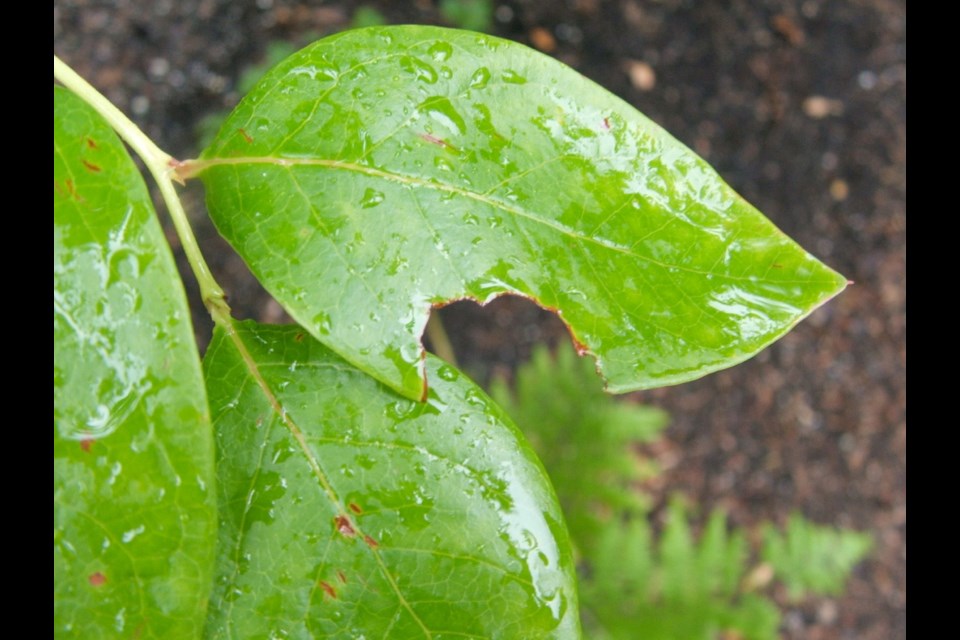Dear Helen: What might be taking out neat, semi-circular notches from the leaf edges of plants?
D.S.
This is probably the work of the leafcutter bee. These useful insects cut away half-circles from the foliage of smooth-leaved plants such as roses, apples and lilacs. I’ve watched them at work removing pieces from my blueberry leaves.
The bees use the leaf pieces they remove to roll into cigar-shaped nests that will contain several cells, each with a single egg along with a supply of pollen.
They locate the nests in soil, in holes they find in wood, and in hollow stems.
All members of the leafcutter group of bees are important pollinators of home garden and agricultural plants. I choose to admire their precise, one could say artistic, handiwork.
Dear Helen: My lilac bush is not doing well. It seems to be generally flagging, with some spotting on a few leaves. It barely bloomed in the spring. What can I do to perk it up?
M.E.
Lilacs are prone to a number of fungal diseases and a blight that can cause spotting, discolouring and/or wilting, but these symptoms usually manifest themselves in spring, often during cool, rainy weather.
Following a few general guidelines can help to restore and renew lilacs with problems.
First, prune away stems and shoots that are clearly diseased. Cut well below obviously infected parts and disinfect pruners between cuts using rubbing alcohol or a 10 per cent bleach solution.
If the bush is congested, thin out its inner growth to allow for free circulation of air and sunlight penetration to all parts of the plant.
Clean up carefully under and around the lilac. If the soil is acidic, lightly scratch in some lime. Then apply a nourishing compost mulch layer.
Try to water at ground level to keep the foliage as dry as possible. Lilacs require excellent drainage, with a soil kept adequately and consistently moist but never wet. Avoid over-fertilizing with nitrogen, which promotes an abundance of soft green growth that is susceptible to disease.
Dear Helen: Some of my garden’s staked tomatoes are disfigured by the leaves rolling up. What could be causing this, and what can be done about it?
B.T.
The hot, dry late spring weather helped to make this a common problem with tomatoes. Tomato leaf rolling is usually caused by stressors such as heat and drought. Some varieties are more prone than others to developing the condition. It’s helpful to try one or two new tomato varieties each year, to develop a repertoire of tomatoes that are close to trouble free in your garden’s conditions.
To aid struggling plants, keep the soil consistently well watered and spread a generous layer of home-produced or purchased compost under and around the plants to help enrich the soil and keep it moist.
Dear Helen: Since moving my beautiful hardy hibiscus outside from its place in the sun room, most of the leaves have fallen or turned yellow. It still has one big bloom. How should I proceed?
J.T.
“Hardy” hibiscus plants are best allowed to die back in winter, to grow again the following spring. Your plant, kept indoors for the winter, has grown straggly and has struggled to adapt to the outdoors.
The plants vary in hardiness. I have over-wintered mine, in their pots, against a sheltered house wall. Others use an unheated greenhouse, a garage or an attic. Only one of mine has consistently survived successive winters. It is growing strongly now and should bloom this month.
I would cut your plant back fairly drastically, and repot into a slightly wider container. That should give it a new start.
Garden events
Picnic in the gardens. The Horticulture Centre of the Pacific, 505 Quayle Rd. in Saanich, is inviting families and friends to bring their own dinners for a picnic in the gardens this evening. Enjoy local musicians, browse through the works of local arts vendors, visit a master gardener booth for answers to gardening questions, and check out sales of plants propagated from the gardens. Admission is by donation between 5 and 8 p.m. hcp.ca.
Pruning party. The B.C. Fruit Testers are hosting a free pruning party on Saturday, July 20, from 10 a.m. to 12 p.m. in the Walled Garden at Royal Roads University, 2005 Sooke Rd. in Victoria. Participants are invited to bring their pruners for some hands-on practice. Follow the signs to the Mews pay parking.



